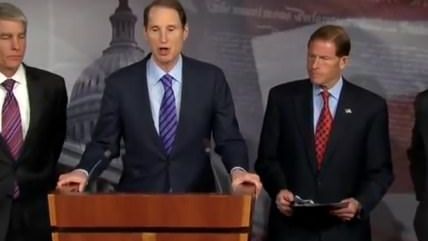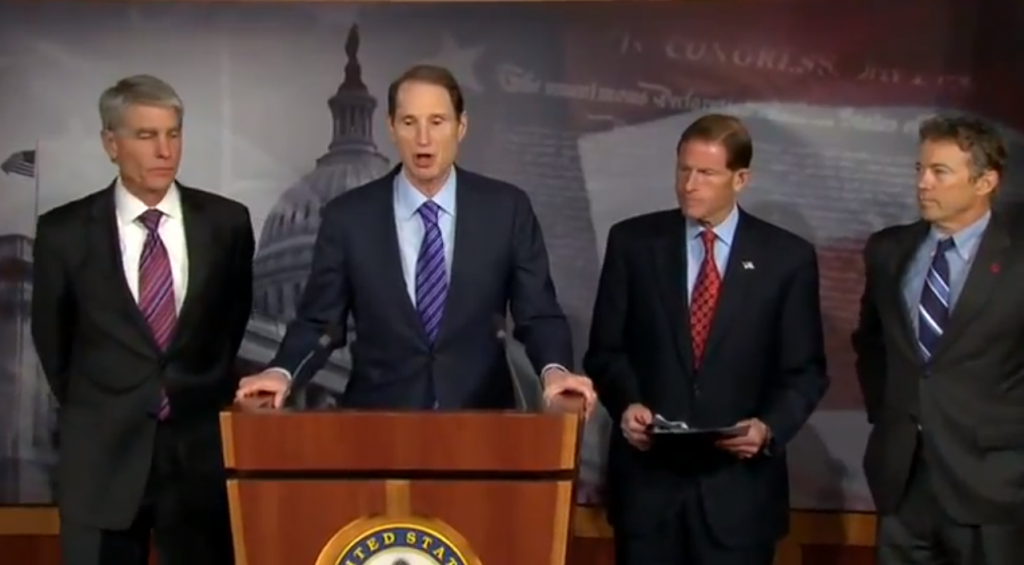Sens. Wyden, Udall, Paul take to L.A. Times to Demand Real NSA Reform


Senators Ron Wyden, Mark Udall, and Rand Paul (D-Ore., D-Colo., and R-Ky., respectively) have penned a group commentary for the Los Angeles Times pushing hard for an end to National Security Agency bulk data collection and criticizing the lackluster USA Freedom Act Congress is considering instead. Acknowledging the one-year anniversary of Edward Snowden's leaks, they write:
Dragnet surveillance was approved by a secret court that normally hears only the government's side of major cases. It had been debated only in a few secret congressional committee hearings, and many members of Congress were entirely unaware it. When laws like the Patriot Act were reauthorized, a vocal minority of senators and representatives — including the three of us — objected, but the secrecy surrounding these programs made it difficult to mobilize public support.
And yet, it was inevitable that mass surveillance and warrantless searches would eventually be exposed. When the plain text of the law differs so dramatically from how it is interpreted and applied, in effect creating a body of secret law, it simply isn't sustainable. So when the programs' existence became public last summer, huge numbers of Americans were justifiably stunned and angry at how they had been misled and by the degree to which their privacy rights had been routinely violated. Inflated claims about the program's value have burst under public scrutiny, and there is now a groundswell of public support for reform.
The senators gave details on some of their proposed reforms, many of which were stripped from the USA Freedom Act:
This package of reforms includes overhauling domestic surveillance laws to ban the bulk collection of Americans' personal information, and closing the loophole that allows intelligence agencies to deliberately read Americans' emails without a warrant. It includes reshaping the Foreign Intelligence Surveillance Court by installing an advocate who can argue for Americans' constitutional rights when the court is considering major cases, and by requiring that significant interpretations of U.S. law and the Constitution be made public. And it would strengthen and clarify the government's authority to obtain individual records quickly in genuine emergency situations.
They believe the wording of the USA Freedom Act is vague enough to allow the bulk collection of data to continue and are declaring their opposition to the law's passage.
Read their full op-ed here.
Editor's Note: As of February 29, 2024, commenting privileges on reason.com posts are limited to Reason Plus subscribers. Past commenters are grandfathered in for a temporary period. Subscribe here to preserve your ability to comment. Your Reason Plus subscription also gives you an ad-free version of reason.com, along with full access to the digital edition and archives of Reason magazine. We request that comments be civil and on-topic. We do not moderate or assume any responsibility for comments, which are owned by the readers who post them. Comments do not represent the views of reason.com or Reason Foundation. We reserve the right to delete any comment and ban commenters for any reason at any time. Comments may only be edited within 5 minutes of posting. Report abuses.
Please to post comments


Dragnet surveillance was approved by a secret court that normally hears only the government's side of major cases.
Well, sure, when you put it like that.
It IS like that. Should be WAS. But it ISN'T yet.
When the plain text of the law differs so dramatically from how it is interpreted and applied...
Kinda like how "shall not be infringed" has been interpreted to mean "can be regulated out of existence?"
Or "interstate commerce" means intrastate commerce, intrastate non-commerce, and everything else under the sun
When the plain text of the law differs so dramatically from how it is interpreted and applied, in effect creating a body of secret law, it simply isn't sustainable.
Thanks, SCOTUS.
It includes reshaping the Foreign Intelligence Surveillance Court by installing an advocate who can argue for Americans' constitutional rights when the court is considering major cases
Eric Holder does that.
As some pants shitter remarked to me, "It won't be so funny when there's another 9-11! These senators, and all who voted for them, belong in Gitmo!"
So if there is another major terrorist attack on US soil despite the massive increase in budget, scope and authority of these agencies over the past 12 years, the people who have objected to said increases should be thrown in prison. Great. So the NSA now has incentive to allow another terrorist attack to succeed. I mean, they already had that incentive, but now at least one useful idiot supports it.